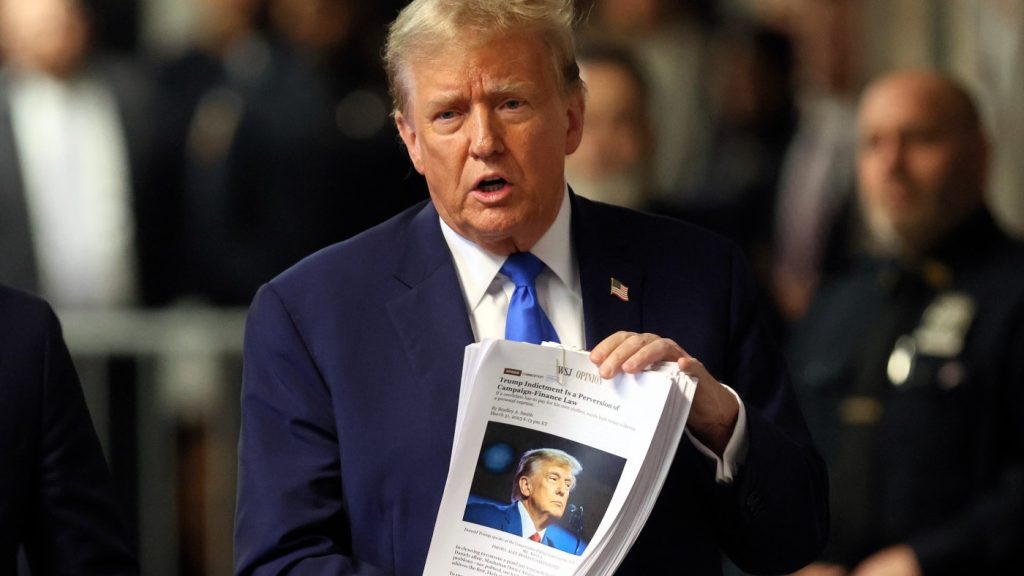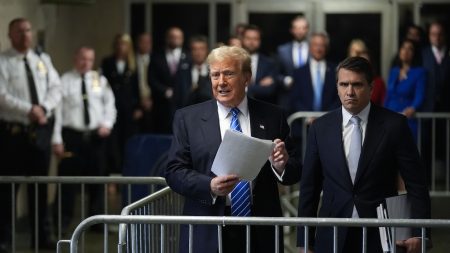Reporters covering the New York trial of former President Trump were warned by the judge after a juror was dismissed due to frustration about extensive media coverage of the case.
Justice Juan Merchan told the press to stop reporting details about prospective jurors' employers and physical characteristics after some outlets published stories with this information that had been shared in open court.
Another juror was dismissed for unrelated reasons but also expressed frustration to the judge about the public attention.
The judge said to reporters, “We just lost, probably, what probably would have been a very good juror for this case, and the first thing that she said was she was afraid and intimidated by the press, all the press, and everything that had happened.”
The judge then asked the press to use common sense and follow the instructions.
The loss of the jurors was a setback, but the full jury of 12 New Yorkers and the first alternate were seated later on the trial’s third day.
Merchan said he expects the process to finish Friday after the remaining five alternates are selected.
The judge's warning showed how difficult it is to select a jury in this high-profile case, because the public only knows what reporters publish, as no cameras are allowed inside the courtroom except for a few minutes each day.
Trump’s New York trial is his first criminal case and the first time a former U.S. president has stood trial on criminal charges. He is accused of falsifying business records in connection to a hush money deal with an adult film actress before the 2016 election. He pleaded not guilty and said the records were truthful.
The judge ordered an anonymous jury in the historic trial to protect the New Yorkers’ safety, similar to Trump’s two civil jury trials last year.
However, unlike those trials, Merchan's questionnaire for prospective jurors included prompts asking about their current and past employers, which led to jurors providing specific details about their lives in open court.
The former president has a history of attacking people involved in his case, sometimes resulting in threats to their safety.
The first juror dismissed Thursday expressed concern about her ability to be impartial after being questioned by friends, family, and colleagues about whether she was selected for Trump’s jury based on media reports.
The woman said, “I don’t believe at this point that I can be fair and unbiased and let the outside influences not affect my decision making in the courtroom.”
The judge responded, “Thank you. I am sorry that you went through that.”
The second juror who got dismissed, also chosen a day earlier, had a more complex story. Prosecutors told the judge that they found an article about a person with the same name getting arrested in the 1990s and evidence that the juror’s wife was previously involved in a corruption inquiry.
All jurors were asked in a 42-question survey if they or someone close to them had ever been accused or convicted of a crime. The district attorney’s office suggested the juror may have lied about that.
The juror was interviewed again at the judge’s bench, away from reporters inside the courtroom. However, journalists noted that most questions seemed to come from the prosecution side, and a few answers made Trump attorney Todd Blanche laugh.
After the sidebar ended, Merchan seemed to sternly talk to the juror and then dismissed him shortly after. The judge did not explain the reason but hinted that the juror was “annoyed” about the amount of information published about him.
News organizations this week have published different levels of detail about who is serving on the panel. The Hill published some details Merchan disagreed with but had decided to withhold certain information to keep jurors’ identities secret.
The judge did not single out any specific outlet on Thursday, but he said the press in general had gone too far, calling it a “problem” and effectively imposing a gag order on journalists covering the trial.
“There is a reason why this is an anonymous jury and why we have taken the measures that we have taken, and it kind of defeats the purpose of that when so much information is put out there that it is very, very easy for anyone to identify who the jurors are,” Merchan said.
New York state law around media coverage of the courts is among the strictest in the country. It’s one of two states that still bars the use of cameras in the courtroom.
Because of that, any information that comes out in the courtroom where Trump’s historic trial is being held must be passed on indirectly, through reporters, to the public.
Merchan said that the press can “write about anything that’s said on the record,” but advised reporters to use “common sense.”
“If you can’t do that, if we can’t stick to that, we will have to see what else we need to do to ensure that the jurors remain safe,” Merchan added.









